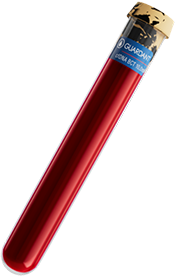References
1. Data on file. Guardant Health, Inc.
2. Kim ST, Raymond VM, Park JO, et al. Combined genomic and epigenomic assessment of cell-free circulating tumor DNA (ctDNA) improves assay sensitivity in early-stage colorectal cancer (CRC). Cancer Res. 2019;79(suppl 13):916. doi:10.1158/1538-7445.AM2019-916
3. Westesson O, Axelrod H, Dean J, et al. Integrated genomic and epigenomic cell-free DNA(cfDNA) analysis for the detection of early-stage colorectal cancer. Cancer Res. 2020;80(suppl 16):2316. doi:10.1158/1538-7445.AM2020-2316
4. Dean J, He Y, Raymond V, et al. Plasma based cell-free circulating tumor DNA (ctDNA) assessment for non-invasive detection of colorectal cancer (CRC). Gastroenterology. 2020;158(6 suppl 1):S-369. doi:10.1016/S0016-5085(20)31616-4
5. Evaluation of the ctDNA LUNAR test in an average patient screening episode (ECLIPSE). ClinicalTrials.gov identifier: NCT04136002. https://clinicaltrials.gov/ct2/show/NCT04136002?term=NCT04136002&draw=2&rank=1
6. American Society of Clinical Oncology. Colorectal cancer: statistics. https://www.cancer.net/cancer-types/colorectal-cancer/ statistics
7. Guardant Health initiates ORACLE study to evaluate performance of Guardant Reveal™ Blood Test to predict recurrence across early-stage cancers. https://investors.guardanthealth.com/pressreleases/press-releases/2021/Guardant-Health-Initiates-ORACLE-Study-to-Evaluate-Performance-of-Guardant-Reveal-Blood-Test-to-Predict-Recurrence-Across-Early-Stage-Cancers/default.aspx
8. Guardant Health expands Guardant360® portfolio with new tests for treatment response monitoring and complete genomic profiling. https://investors.guardanthealth.com/press-releases/press-releases/2021/Guardant-Health-Expands-Guardant360-Portfolio-With-New-Tests-for-Treatment-Response-Monitoring-and-Complete-Genomic-Profiling/default.aspx
9. Guardant Health receives expanded Medicare coverage for Guardant360 across the vast majority of solid tumor cancers. https://investors.guardanthealth.com/press-releases/press-releases/2019/Guardant-Health-Receives-Expanded-Medicare-Coverage-for-Guardant360-Across-the-Vast-Majority-of-Solid-Tumor-Cancers/default.aspx 10. FDA approves first liquid biopsy next-generation sequencing companion diagnostic test. https://www.fda.gov/news-events/ press-announcements/fda-approves-first-liquid-biopsy-next-generation-sequencing-companion-diagnostic-test.
11. Colorectal cancer facts & figures 2017-2019. American Cancer Society. Accessed April 20, 2021. https://www.cancer.org/content/dam/cancer-org/research/cancer-facts-and-statistics/colorectal-cancer-facts-and-figures/colorectal-cancer-facts-and-figures-2017-2019.pdf
12. Fight Colorectal Cancer: Stats and Facts. Accessed August 2020. https://fightcolorectalcancer.org/colorectal-cancer/facts-stats
13. CDC Press Release. Colorectal cancer screening rates remain low. Accessed October 2021. https://www.cdc.gov/media/releases/2013/p1105-colorectal-cancer-screening.html
14. Doubeni CA, Fedewa SA, Levin TR, et al. Modifiable failures in the colorectal cancer screening process and their association with risk of death. Gastroenterology. 2019;156(1):63-74. doi:10.1053/j.gastro.2018.09.040
15. Gellad ZF, Stechuchak KM, Fisher DA, et al. Longitudinal adherence to fecal occult blood testing impacts colorectal cancer screening quality. Am J Gastroenterol. 2011;106(6):1125-1134. doi:10.1038/ajg.2011.
16. Inadomi JM, Vijan S, Janz NK, et al. Adherence to colorectal cancer screening: a randomized clinical trial of competing strategies. Arch Intern Med. 2012;172(7):575-582. doi:10.1001/archinternmed.2012.332
17. Exact Sciences. Third quarter 2019 webcast and conference call. Updated October 29, 2019. Accessed December 17, 2021. https:/investor.exactsciences.com/investor-relations/events-and-presentations/event-details/2019/Third-Quarter-2019-Webcast-Conference-Call/default.aspx
18. Denberg TD, Melhado TV, Coombes JM, et al. Predictors of nonadherence to screening colonoscopy. J Gen Intern Med. 2005;20(11):989-995. doi:10.1111/j.1525-1497.2005.00164.x
19. Guardant Health. Q3 2022 Earnings Call. Accessed November 30, 2022. https://s26.q4cdn.com/594050615/files/doc_financials/2022/q3/Q3-2022-Earnings-Presentation-Final.pdf
20. Centers for Disease Control and Prevention. Cost-effectiveness of colorectal cancer interventions. Updated August 18, 2021. Accessed December 7, 2021. https://www.cdc.gov/chronicdisease/programs-impact/pop/colorectal-cancer.htm
21. Liles EG, Coronado GD, Perrin N, et al. Uptake of a colorectal cancer screening blood test is higher than of a fecal test offered in clinic: a randomized trial. Cancer Treat Res Commun. 2017;10:27-31. doi:10.1016/j.ctarc.2016.12.004
22. Parks P. Innovation in colorectal cancer screening - there has to be a better way. Am J Manag Care. Published October 9, 2017. Accessed September 17, 2021. https://www.ajmc.com/view/innovation-in-colorectalcancer-screening-there-has-to-be-a-better-way
23. American Society of Clinical Oncology. Colonoscopy. Cancer.net website. Updated December 2019. Accessed December 7, 2021. https://www.cancer.net/ navigating-cancer-care/diagnosing-cancer/tests-and-procedures/colonoscopy
24. ACS Colorectal Cancer Facts 2020-2022
25. Adler A, Geiger S, Keil A, et al. Improving compliance to colorectal cancer screening using blood and stool based tests in patients refusing screening colonoscopy in Germany. BMC Gastroenterol. 2014;14:183. doi:10.1186/1471-230X-14-183




